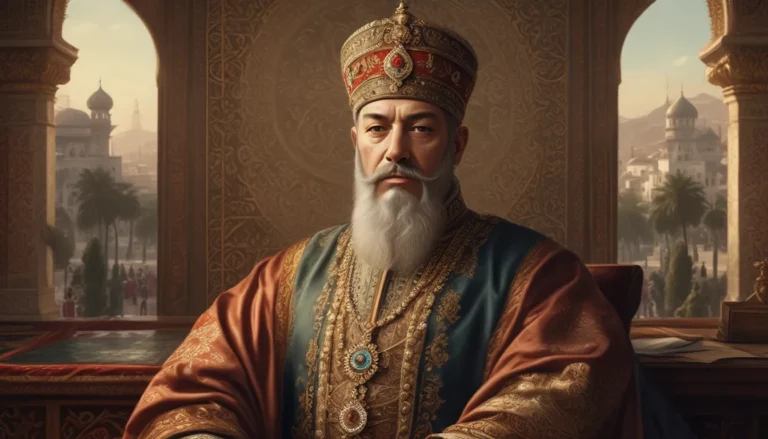The images in our articles may not match the content exactly. They are used to grab your attention, not to show the exact details in the text. The images complement the text but do not replace it.
Are you curious about the enigmatic man behind the iconic quote, “Be yourself; everyone else is already taken”? Oscar Wilde, a literary virtuoso celebrated for his wit, flamboyant style, and groundbreaking literary works, has captivated audiences and scholars alike for generations. Delve into the intriguing world of this visionary figure as we unravel 16 captivating facts about Oscar Wilde that offer a glimpse into his extraordinary life. Whether you’re a devoted fan or simply intrigued by literary legends, these insightful tidbits are sure to entertain and enlighten you. Let’s embark on a journey to uncover the allure and brilliance of Oscar Wilde, a man far ahead of his time.
Unveiling Oscar Wilde’s Life Story
Oscar Wilde, born on October 16, 1854, in Dublin, Ireland, transcended the realm of a mere 19th-century playwright, poet, and author to emerge as a literary maverick whose legacy continues to resonate with audiences worldwide. His full name, Oscar Fingal O’Flahertie Wills Wilde, reflected his distinguished lineage and the intellectual eminence of his family within Dublin’s cultural and social spheres.
The Origins of Wilde’s Genius
- Wilde’s parents, Sir William Wilde and Jane Francesca Elgee, were esteemed intellectuals in their own right. His father, a renowned ear and eye surgeon and author, shared his expertise in archaeology and folklore, while his mother, a prolific writer using the pen name “Speranza,” was a revolutionary poet who held a prominent position in Dublin’s literary circles.
- Demonstrating exceptional proficiency in classical studies from a young age, Wilde’s academic pursuits led him to Trinity College, Dublin, where he garnered acclaim by winning the prestigious Berkeley Gold Medal in Greek, a testament to his profound knowledge and appreciation of classical literature.
Wilde’s Academic Sojourn at Oxford
Transitioning to Magdalen College, Oxford, Wilde continued to cultivate his literary prowess and cultivate a distinctive persona characterized by flamboyance and wit.
The Aesthetic Movement Maven
- Embracing the aesthetic movement at Oxford, Wilde championed the philosophy of “art for art’s sake,” emphasizing the intrinsic beauty of art devoid of moral or political imperatives. This ethos profoundly influenced his later literary endeavors.
- A notable fixture at Oxford for his razor-sharp wit and flamboyant attire, Wilde challenged societal conventions with his clever repartee and sartorial extravagance, subverting norms and expectations with flair.
The Literary Odyssey of Oscar Wilde
Wilde’s literary trajectory traversed an array of genres, from journalism to poetry, culminating in plays and a seminal novel that continue to resonate with audiences for their exploration of morality, identity, and societal norms.
Literary Milestones of a Maverick
- The publication of Wilde’s sole novel, “The Picture of Dorian Gray,” in 1890 sparked controversy with its themes of hedonism and moral ambiguity, evolving into a timeless classic of English literature despite the ensuing scandal.
- Renowned for his plays like “The Importance of Being Earnest” and “An Ideal Husband,” Wilde captivated audiences with his incisive wit and insightful critiques of Victorian society, cementing his status as a luminary in English theatre and literature.
Trials and Tribulations: Wilde’s Legal Ordeals and Incarceration
While Wilde’s literary acclaim soared, his personal life entangled him in legal battles that posed a profound challenge to his career and legacy.
The Turbulent Trials
- In 1895, Wilde faced legal repercussions for “gross indecency” due to his relationships with men, a reflection of the stringent anti-homosexuality laws prevalent during that era. His subsequent conviction and two-year sentence of hard labor inflicted a toll on his well-being and spirit.
- Undeterred by adversity, Wilde continued to write during his incarceration, crafting “De Profundis,” an extensive letter to his paramour, Lord Alfred Douglas, delving into themes of life, love, and suffering with poignant introspection and candor.
Wilde’s Denouement and Enduring Legacy
Despite grappling with declining health and financial woes in his twilight years, Wilde’s literary acumen and wit endure as influential beacons.
- Following his release from prison in 1897, Wilde assumed the alias “Sebastian Melmoth” in France, penning “The Ballad of Reading Gaol,” a poignant poem reflecting on the stark realities of prison life.
- Tragically succumbing to meningitis in Paris on November 30, 1900, at the age of 46, Wilde’s legacy reverberates through his enduring works and profound quotes that illuminate the intricacies of human nature and society.
Immortalizing Wilde’s Legacy
- Posthumous commemorations in Dublin, London, and beyond, through plaques, statues, and memorials, honor Wilde’s legacy and cultural impact, transforming his childhood abode and significant locales into revered pilgrimage sites.
- Wilde’s influence extends beyond literature into the realms of popular culture, manifesting in myriad films, plays, and books that elucidate his life, works, and cherished themes.
- Academic institutions and literary societies globally continue to extol Wilde’s contributions to literature and society, ensuring his indelible imprint endures for forthcoming generations.
- Noteworthy events like the annual Oscar Wilde Awards in Los Angeles, celebrating Irish cultural and artistic achievements, further enshrine Wilde’s stature as a transcendent cultural icon traversing temporal and geographical boundaries.
Celebrating the Legacy of Oscar Wilde
Oscar Wilde’s indelible imprint on literature and culture continues to captivate and inspire audiences, from his cutting humor to his astute observations on human nature. His plays, novels, and essays transcend mere relics of a bygone era, resonating with timeless themes of love, society, and individuality. Reflecting on these 16 revelatory facts, one discerns that Wilde’s legacy transcends more than his eloquent words; it embodies a life rich in flamboyance, audacity, and ultimately, an unwavering commitment to authenticity. Venturing from his meteoric rise to his poignant demise, Wilde’s narrative reaffirms the transformative power of art to provoke, enchant, and perdure through the annals of time.
Unveiling the Enigmatic Wilde: Answers to Your Queries
Was this page helpful?
Our dedication to providing informative and engaging content resonates at the core of our mission. Each fact shared on our platform emanates from real users like you, fostering a diverse repository of insights and knowledge. Upholding stringent standards of accuracy and credibility, our dedicated editors meticulously scrutinize each submission, ensuring that the information we offer not only captivates but also enlightens. Rest assured in our commitment to quality and authenticity as you embark on an enriching journey of exploration and learning with us.
By infusing Oscar Wilde’s essence into these compelling narratives, we invite you to traverse the vibrant tapestry of his life and works, an enduring legacy that continues to illuminate and inspire generations. Embrace the brilliance of Wilde’s words, the audacity of his spirit, and the timeless allure of his unparalleled literary genius—a legacy that stands as a testament to the everlasting power of art and authenticity.






